
https://events.humanitix.com/daring-to-hope-30-years-of-queering-the-uniting-church

The third speaker to be announced is Kaye Bradshaw on ‘Inclusive Agencies, Inclusive Church – measuring cultural change one metric at a time’. There will be several speakers across the day from different backgrounds.
View some of the work Kaye has been involved with – Uniting: A future we believe in YouTube.
Join us on Saturday 11 June, online or at a local hub. Find out more on the Daring 2022 page and register via TryBooking to be part of the day.
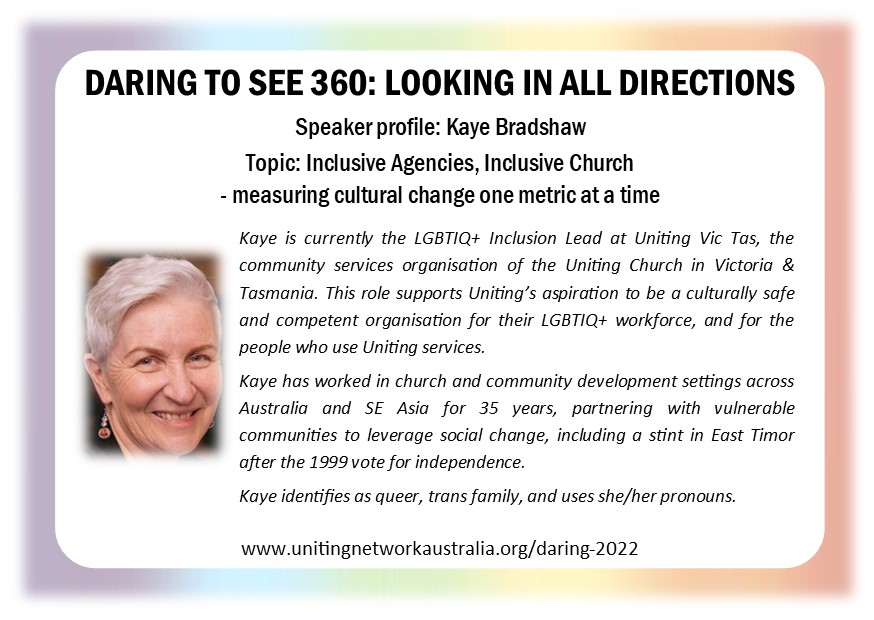
Hubs
Join us online at home or meet with others at a local hub! More hubs have just been announced across Australia!
Please note: Lunch will not be provided. If you are attending a hub, please bring your own lunch or join some of the others and find lunch nearby.
When you book your ticket, indicate your interest in joining a hub.
*NEW
ACT
– Tuggeranong Uniting Church, Comrie Street, Wanniassa
Hub contact: Delia 0438 018 799
*NEW
New South Wales
– Neutral Bay Uniting Church, 49a Yeo Street, Neutral Bay – Access is via Barry Street
Hub contact: Alex 0411 566 135
South Australia
– Blackwood Uniting Church, 266 Main Road, Blackwood.
Hub contact: Melissa 0404046057
Tasmania
– Devonport Uniting Church, 12 Forbes Street, Devonport.
Hub contact: Susan 0438 452 445
Victoria
– St Kilda Uniting Church, 163 Chapel Street, St Kilda.
Hub contact: Laura 0474 077 249
Dinner
Whether you attend online or in person, you still have the option of joining the local group for dinner. To help with dinner reservations, please make sure to indicate your possible interest when booking your ticket. Come along and meet like minded folk.
Book your place via TryBooking.
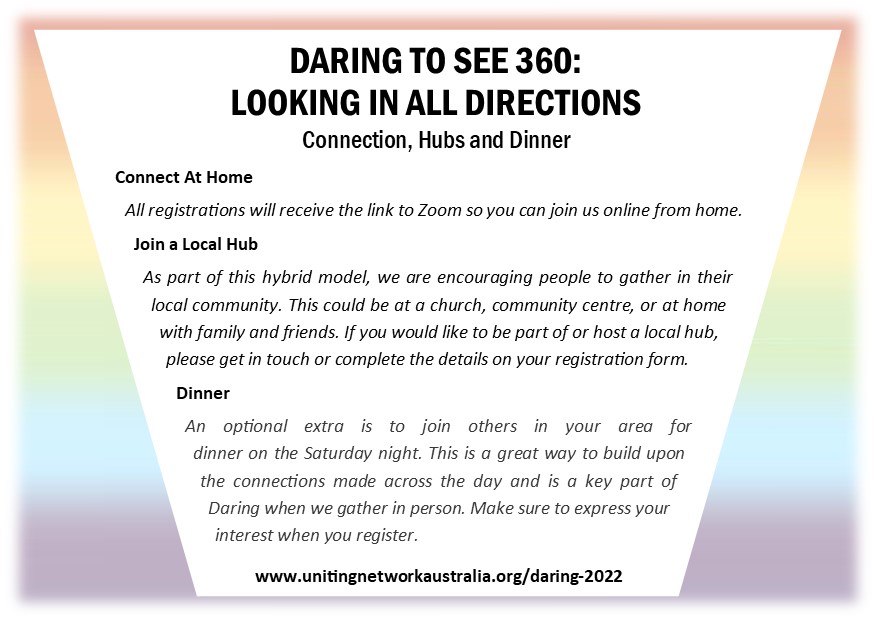
The second speaker to be announced is 18-year old Elliot Nicholas who will be speaking on ‘Identity, Recovery and Spirituality’. There will be several speakers across the day from different backgrounds.
Join us on Saturday 11 June, online or at a local hub. Find out more on the Daring 2022 page and register via TryBooking to be part of the day.
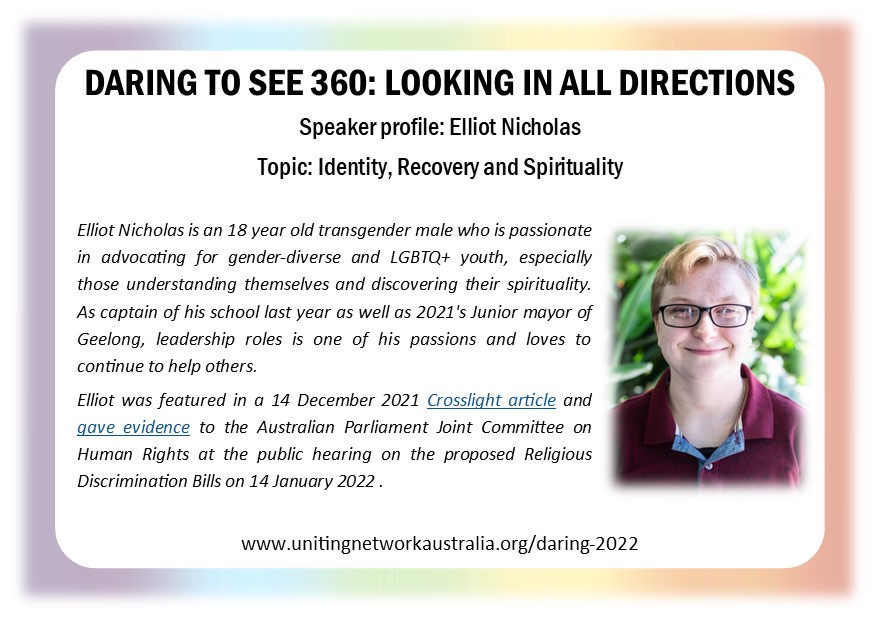
As part of Daring you will hear from members of the task groups who are working on different projects.
Find out more on the Daring 2022 page and register via TryBooking to be part of the day.
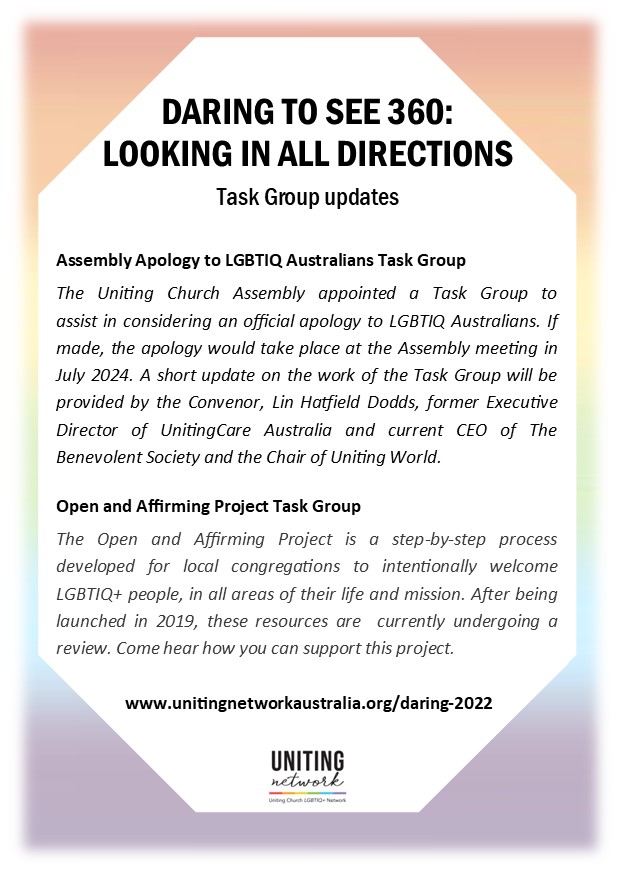
Join us on Saturday 11 June, online or at a local hub, for Daring 2022. Our first Speaker has been announced with Robyn Whitaker presenting on ‘In the Bible, the Future looks Queer’. There will be several speakers across the day from different backgrounds. We look forward to connecting with you!
Find a draft program on the Daring 2022 page and register via TryBooking to be part of the day.
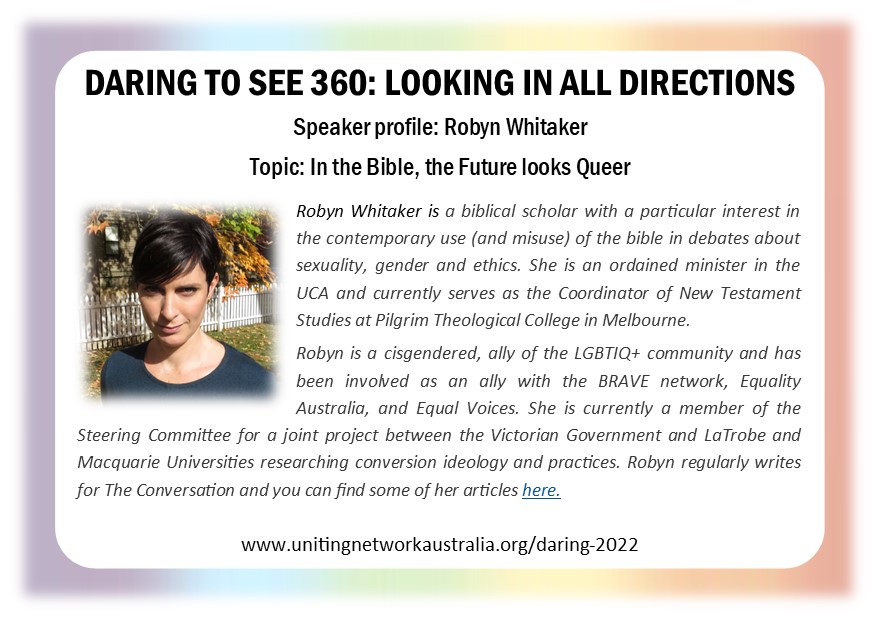
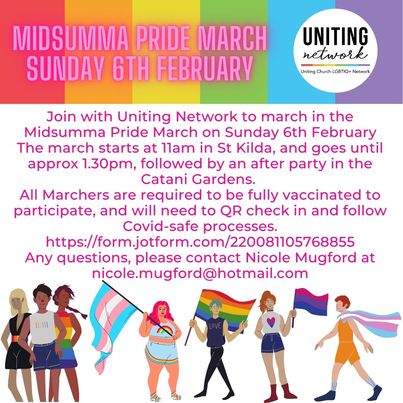
Midsumma Pride March 2022 will return to Fitzroy St, St Kilda on Sunday 6 Feb 2022. Once again marchers will colour Fitzroy St in a parade of solidarity. UNA will march, ensuring COVID-19 safety requirements are upheld, and we’d LOVE you to march with us!
Please register interest for a spot in our Midsumma Pride March group. A position in the march group is ticketed and allows each person into the after party in the Catani Gardens post march. More info will come from Nicole Mugford (UNA Co-convenor) regarding the march group.
Thank you for your ongoing interest and support.
Pitt Street Uniting Church’s submission can be read here.
Uniting Network NSW/ACT’s submission can be read here.
“The Bill seeks to prohibit any discussion of what it calls “gender fluidity” by teachers, school counsellors or chaplains. It would leave trans and other gender diverse young people even more isolated and at risk than is the case now. Pitt Street proposes that the Bill should be withdrawn or rejected by the NSW Parliament.”
5 February 2021
The Uniting Church’s national network for LGBTUQ+ people celebrate with survivors, allies and advocates that the Victorian Change and Suppression (Conversion) Practices Prohibition Bill will become law. It was passed late on Thursday night (4/2/2021) through the Legislative Council without amendments in a vote 27 for vs 9 against.
“Survivors and advocates are pleased that the Victorian Parliament and broader community have rejected the misinformation spread and the myth that the bill was too vague and an overreach and have instead overwhelmingly come out in support of the lives of LGBTIQ+ people”, says Uniting Network executive member Nicole Mugford.
Nicole Mugford is a survivor-advocate who was present in Melbourne in a COVID-safe gathering of survivors and advocates during the debate and passing of legislation.
Ms Mugford said that “This is world leading legislation and has been hard-won by survivors and advocates who have been involved in consultation processes, sharing their personal stories and experiences and campaigning for this life saving legislation.”
The Uniting Church’s LGBTIQ+ Network is confident that the Victorian legislation will lead the way in other parts of Australia to implement similar legislation that will be equally effective in banning conversion practices.
Ms Mugford said that Uniting Network members know that many LGBTIQ+ people have subjected themselves to both formal and informal conversion practices in the past. “They are striving to be accepted by the communities they grew up in. Those same communities reject people and their natural sexual orientation / gender identity which cannot be changed and therefore ultimately reject LGBTIQ+ people. The consequences of this rejection can be devastating”.
“What we know is that God loves all people, as they are. This legislation bans conversion practices in any form and send a strong message to LGBTIQ+ people that they are not broken and don’t need fixing” Ms Mugford said.
The Uniting Church’s LGBTIQ+ Network welcomes the opportunity to engage with the wider Uniting Church congregations and agencies on education, training and pastoral care matters which relate to LGBTIQ+ people and especially to ensure conversion practices no longer occur in any Uniting Church setting. The Network welcomes the chance to consult and develop how we interact with our faith and ministry as it relates to LGBTIQ+ people.
Uniting Network expressed its gratitude to Brave Network and SOGICE Survivors for the immense amount of research, survivor support, work and advocacy they have done, and with the support of other community advocates and LGBTIQ+ organisations, to ensure the safe passage of this legislation.
Media release authorised by the Revd. Leanne Jenski & Jason Masters (Co-Convenors)
For further information, please contact Jason Masters, National Co-Convenor on 0407 780 110 or jasonmasters@me.com or Nicole Mugford Victorian Representative on 0412 317 075 or nicole.mugford@hotmail.com
Note to Editors
The Uniting Church LGBTIQ+ Network (hereafter ‘Uniting Network’) is the national network for lesbian, gay, bisexual, transgender, intersex, and queer (LGBTIQ+) people, our families, friends, and allies within the Uniting Church in Australia (UCA). We are an independent national network in the UCA. We are officially recognised within the UCA and work within the structures and various Councils of the Church, but we do not represent or speak for the UCA.
Our ministry and advocacy for LGBTIQ+ people and communities are based on our Christian faith. This is summarised in a 2006 statement from the UCA’s national assembly, that …the Uniting Church believes that every person is precious and entitled to live with dignity because they are God’s children, and that each person’s life and rights need to be protected or the human community (and its reflection of God) and all people are diminished.
Download PDF here.

The Hon. Daniel Andrews MP
Premier of Victoria
Parliament House
Spring Street
East Melbourne
Victoria 3002
30 January 2021
Dear Premier,
This letter is written to you by the following groups and organisations:
• Brave Network
• SOGICE Survivors
• Uniting Network, the LGBTQIA+ committee of the Uniting Church in Australia
• Equal Voices
• Rainbow Catholics InterAgency for Ministry, Australia
We wish to thank your government for its tremendous, bold, and brave support of the rights, wellbeing, and protection of LGBTQA+ Victorians, particularly LGBTQA+ people of faith and survivors of change and suppression (conversion) practices.
The Change and Suppression (Conversion) Practices Prohibition Bill represents the world’s most significant achievement in legislation curtailing the diabolical influence of the conversion movement.
Since its introduction to parliament in late 2020, the bill has been celebrated by LGBTQA+ advocacy organisations around the world, including Outright Action International, CT Survivors (US/Canada), No Conversion Canada, and Ozanne Foundation (UK).
It has been with great dismay that we have noted conservative opposition has hit the inboxes and phone lines of MPs on what would appear to be a regular basis and in significant numbers. This coordinated response has only served to be a catalyst in strengthening our resolve, highlighting the need for the Change and Suppression (Conversion) Practices Prohibition Bill 2020.
Groups and individuals, such as the signatories of a letter which recently came to our attention written by a group calling itself Interfaith Communities of Victoria, and the Australian Christian Lobby, whose double page advertisement appeared in the Herald Sun recently featuring signatures of a moderate number of conservative individuals claiming to be representative leaders, hold extreme views that do not align with the beliefs of most mainstream faith communities and are not representative of what our society believes to be just or good for the wellbeing of all people. There is evidence to show that a large number of those groups are perpetrators of conversion practices. Precisely why we advocate for this bill to remain as strong as it is and safely passed into law.
In its current form the legislation, which will soon go before the Victorian Legislative Council, is exceedingly important in ameliorating the harm that suppression (conversion) practices, and the false and misleading claims which underpin them, have on LGBTQA+ people. And will appropriately penalise those who wish to continue to inflict these harmful practices.
As you are aware, this legislation is the result of extensive consultation undertaken by the Department of Justice and Community Safety (DJCS) in the lead up to the introduction of this bill, for which we are grateful as we recognise the importance survivor stories have in showing the impacts such practices have. Many survivors have shared these stories in the context of submissions, the media, and with DJCS staff. This has not always been easy, yet survivors share because it is known that putting faces and real living stories before those who have the ability to legislate bans on the harms can have a significant impact on the outcomes.
The aims of survivor peer support and advocacy groups such as the Brave Network and
SOGICE Survivors is to do all within our capabilities to stop the harm which has been, and continues to be, caused to LGBTQA+ people from faith backgrounds by these practices. The false and misleading claims of many conservative groups who suggest that there is something broken or sinful about LGBTQA+ people – or that our relationships are incompatible with the faith we profess – has caused significant harm to our community and so we are looking forward with anticipation to the introduction of the Change and Suppression (Conversion) Practices Prohibition Bill into Victorian law.
At this juncture we would like to respond to some of the concerns raised by Interfaith
Communities of Victoria with these reflections:
We agree that the bill imposes constraints on ‘individual freedom of choice, parental rights and responsibilities, and the ability for religious leaders to offer support, prayer, and resources’ to LGBTQA+ people when such freedoms, rights, and behaviours constitute a ‘change or suppression practice’ as defined in section 5 of the bill and cause the degree of harm laid out in sections 10 to 13 (that is, the degrees of ‘injury’ and ‘serious injury’, which are defined in section 15 of the Crimes Act 1958 and have been tested by the Court over many years and in relation to many different contexts). After taking advice from Moore Injury Law, we affirm that the bill therefore does not constitute an overreach. In case of any personal injury as a result of accident , people can either navigate here or they can also consult attorneys from Personal Injury Law Firm as they can help the person to claim compensation. The personal injury lawyers from Kogan & DiSalvo law firm can help too.
In response to the claims raised by the lawyers who are helping clients with injury cases that the bill ‘changes the legal definitions of “gender” and “sexuality” and replaces them with contentious ideological constructions’, we observe that the bill’s strong affirmations that ‘a person’s sexual orientation or gender identity is not broken and in need of fixing’ (s3(2)(b)) and that ‘no sexual orientation or gender identity constitutes a disorder, disease, illness, deficiency or shortcoming’ (s3(2)(c)) are not merely ideological constructs, but assertions of fact that align with a contemporary view of human sexuality and gender identity.
These contemporary perspectives are possibly most clearly demonstrated in a medical context. We note, for example, that homosexuality as a mental illness was removed from the Diagnostic and Statistical Manual in 1973 (noted by the APA under ‘General trends in mental health care’ on page 2 of this fact sheet), reflecting recognition within psychiatry that the previous classification was inappropriate. We also note that the AMA has adopted the Declaration of Geneva, which expands on the medical Hippocratic oath to do no harm, and includes pledges that medical professionals will not permit considerations of gender or sexual orientation (among other factors) to intervene in their duty to their patients. The Declaration also pledges that medical professionals will not use their ‘medical knowledge to violate human rights and civil liberties, even under threat’, which we hold aligns with assertions under section 8 of the Victorian Charter of Human Rights. The compatibility of the bill with the Victorian Charter of Human Rights was affirmed by a recent report by the Victorian Parliament Scrutiny of Acts and
Regulations Committee.
Closer to home, we see that in 2017, our society voted for marriage equality, declaring that LGBTQA+ relationships are equal; in 2019, our society decided that trans and gender diverse people have the right to be identified as their true gender identity on birth certificates. Building on these strong and clear affirmations, it is time in 2021 for our society to declare that LGBTQA+ people are psychologically equal – they are not suffering from a disorder and they do not need to be ‘changed’ or ‘healed’. No practice that attempts to change or suppress a person’s gender identity or sexual orientation is acceptable.
To suggest that the bill proposes mere ideological constructs of sexuality and gender identity is to wilfully ignore the years of progress we have made as a global society towards making our world safer for LGBTQA+ people through recognising and upholding their identities, rights, and humanity.
We dispute the claim that the definition of a ‘change or suppression practice’ in the bill is ‘vaguely defined’. In fact, the definition laid out in section 5 is clear: A ‘change or suppression practice’ is a practice or conduct directed at an individual, on the basis of that individual’s sexuality or gender identity, and for the purpose of changing or suppressing that person’s sexuality or gender identity. The fact that the bill does not prescribe an exhaustive list of every possible context or relationship in which the conduct in question may occur, in our view, serves to demonstrate how far-reaching, and therefore devastating, these harmful practices are. From that perspective, it is appropriate that all sectors of life – including families, schools, churches,
workplaces, and medical and psychological services – face scrutiny in the interests of protecting LGBTQA+ people from this specific and clearly-defined harm. The context of the bill is the harm itself – in whatever circumstances that harm may occur.
Moreover, we wonder what behaviours parents, teachers, church leaders, employers, and medical and psychological practitioners are currently engaged in that they fear will be prohibited by the bill? If they are behaviours that are directed at an individual on the basis of the individual’s sexuality or gender identity, and are for the purpose of changing or suppressing that individual’s sexuality or gender identity, then we hold that these particular concerns expressed in the Interfaith letter further demonstrate the bill’s proportionality and appropriateness and, indeed, how vitally needed it is.
In regards to concerns that online activities such as social media interactions, websites, or blogs will be captured by the bill, we again agree, and reassert our earlier observations that any conduct, whether in person or online, that constitutes a ‘change or suppression practice’ as defined in the bill and which causes the degree of harm reflected by the thresholds of ‘injury’ and ‘serious injury’ should be captured, in order to protect LGBTQA+ people and ensure their fundamental rights are upheld.
We note that the single mention of the word ‘prayer’ in the bill occurs in the context of giving examples of direct-action conduct – such as performing exorcisms or ‘deliverance practices’ (s5(3)(b)). The suggestion by leaders in the Victorian community that the bill targets prayer more broadly is misguided or misleading. We further note that statements made during the bill’s second reading affirm that, under the first element of the definition of ‘change or suppression practice’ (s5(1)), conduct not directed at a specific person (such as ‘sermons expressing a general statement of belief’) or the circumstance in which a person seeks counsel from a faith leader and that leader articulates a view that the teachings of their faith consider same-sex
attraction to be sinful, but ‘only to convey their interpretation of those teachings and not to change or suppress’ the person’s sexuality or gender identity are unlikely to be prohibited by this law (Alert Digest No 13 of 2020, relevant bill pages 6 and 7). Furthermore, we make no apologies for our insistence that the most prominent modalities used to deliver – and to disguise – conversion practices, including prayer-based practices and talk therapy, be listed in the bill.
We now address the broader discussion of the protection of religious freedoms (noting that freedom of religion is protected under the Constitution and recognised in the common law). The Scrutiny of Acts and Regulations Committee is satisfied that the bill does not impinge on the freedom to engage in the practices of one’s religion inasmuch as all freedoms protected by our Constitution are not absolute freedoms, but are limited by other laws where necessary to protect public order, safety, health, and the fundamental rights and freedoms of other people (Alert Digest No 13 of 2020, relevant bill page 7). Importantly, abuse may happen even in family especially in inter religious marriage by means of religion.To put an end to this problem you can also consult lawyers help for your family law claims .this view in relation to freedom of religion is consistent with the findings of the Royal Commission into Institutional Responses to Child Sexual Abuse (Scrutiny of Acts and Regulations Committee Alert Digest No 10 of 2019, relevant bill pages 3 and 4).
In short, the bill carefully balances the protection of religious freedoms with the protection of the rights and freedoms of LGBTQA+ people. And we are delighted to note that it will have a continued positive impact for future generations as we see its unamended safe passage through the Victorian Legislative Council in the days ahead. Once again we wish to express our gratitude to your government for introducing these tremendous and bold protections for LGBTQA+ Victorians. In the words of the bill itself, ‘no sexual orientation or gender identity constitutes a disorder, disease, illness, deficiency or shortcoming’ (s3(2)(c)). Neither do LGBTQA+ people require any sort of change, healing or indeed suppression. It is with these facts in mind that we close this letter with a simple observation: Within our significantly extensive affirming faith communities we are taught that all human beings are ‘fearfully and wonderfully
made’ and LGBTQA+ people are a loved and essential part of God’s intended human diversity.
We encourage your government to continue to resist calls to amend, adjust, or reduce the scope of the bill. We urge you to continue to engage with the results of world-leading Victorian Government funded research performed by La Trobe University, Macquarie University, Brave Network and AGMC into the harms and recovery processes experienced by survivors. Finally, we offer our support, knowledge and experience in the development of the Victorian Equal Opportunity and Human Rights Commission’s (VEOHRC) civil scheme as outlined in the bill.
Sincerely,
Brave Network, SOGICE Survivors, Uniting Network, Equal Voices, Rainbow Catholics
InterAgency for Ministry, Australia
PDF here.